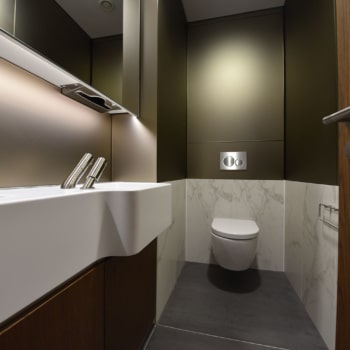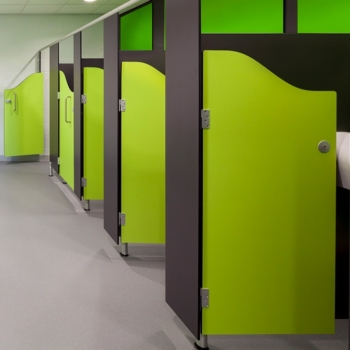There are many different ways to refer to the toilet and the act of going to the toilet that it can be confusing to know what phrase to use in and in what context.
As washroom specialists, we’ve put together a list of all the different words for toilet – from the most popular phrases which are used in the English language to some of the most weird and wonderful, alongside some of the surprising origins for these terms.
Where Does the Word Toilet Come From?
Firstly, what are the origins of the word toilet? In British English, toilet is most frequently used when referring to the place where you can relieve yourself. However, its origins are not English at all. In fact, “toilet” stems from the word “toilette” in French, which translates to dressing room. This referred to the process of getting ready in the morning – including, of course, using the toilet (or the chamber pot as it was known!).
Alternative Words for Toilet and Their Origins
There are many other ways to say toilet in the English language – we’ve listed some here, though you may hear some terms used more than others…
Bathroom
Bathroom is a polite way of calling attention to the toilet and is used commonly in the UK. The bathroom typically means a space which also has a shower or bath in it, though it will always contain a toilet as well.
Washroom
One of the most popular phrases in the US for the toilet is “washroom”. Washroom is another polite way of referring to the toilet, though it is not a common phrase to use in the UK.
Restroom
Restroom is another US phrase which refers to the act of refreshing yourself – hence the word “rest”. As you can imagine, this is a polite way of alluding to using the toilet.
The Men’s/Ladies’ Room
This is another popular way of talking about the toilet, and refers to the way some toilets are arranged by sex. Men would ask for the “men’s room”, whilst ladies would ask for the “ladies’ room”.
The Gents’/Ladies’ Room
Similarly to the above, another way of asking for the men’s room or men’s toilet is to use “the gents’”. This term stems from men being called “gentlemen”.
Water Closet (WC)
Often used on signage in restaurants or public spaces, water closet or WC originates from the 1870s, when toilets were often called “wash-down closets”.
Comfort Room (CR)
The Water Closet equivalent in the Philippines and South-East Asia is the comfort room or CR.
Lavatory
Lavatory has Latin origins, deriving from the word “lavare”. During the Medieval period, this evolved to “lavatorium” and finally to lavatory which is still used today, though not commonly and only in the most formal settings.
The Bog
This is an informal way of referring to the toilet, and dates back to the late 1700s when the toilet was called the bog house.
The Loo
Loo is an informal yet polite British term for toilet. The word “loo” has interesting origins and can be traced back to Medieval Europe, when chamber pots had to be emptied from bedroom windows onto the street below. Whilst doing this, they would cry out the French phrase “guardez l’eau”, meaning “watch out for the water”!
The John
Typically used in the UK as a slang, the John refers to Sir John Harrington – who was the inventor of the prototype of the flushing toilet in the 1500s. He named his invention the Ajax, which stemmed from another name for the word toilet at the time, which was Jakes.
The Jacks
Continuing from the above, Jacks is an Irish slang word for toilet, which can find its origins in the word Jakes in the 16th century.
Powder Room/Powder My Nose
The powder room is largely an American phrase which refers to the women’s washroom, a place where they could go to reapply their make-up – hence the term “powder my nose”, which means to go to the toilet.
The Privy
The privy can often be found in Northern England and Scotland. Privy, coming from the word private, meant a private place for sharing secrets or thoughts.
Khazi
A somewhat outdated phrase, khazi derives from the Cockney word “carsey”, meaning toilet. Khazi, however, can also be linked to Italian “casa”, meaning house, or Swahili “m’khazi” meaning toilet.
Latrine
The latrine isn’t a common way of referring to the toilet, and is mainly used by the British Army. The word has Latin roots in the word “lavare”, which developed over the course of centuries into the French term “latrine”.
The Head
The head became synonymous with the word toilet during the 1600s and 1700s, when toilets were located at the head or the bow of a ship. The first usage of this term in reference to a toilet is recorded in Woodes Rogers’ A Cruising Voyage Around the World (1712).
The Dunny
A term used primarily in Australia and New Zealand, the dunny derives from the archaic English word “dunnekin” which meant dung house or outhouse.
How to Talk About Using the Toilet in English
Whilst it is one thing to name the toilet, it is another thing to either ask to use the toilet or announce that you’re going.
Below are the most proper ways in British English to let people know you’re looking for a toilet.
Where’s The Bathroom/ I Need to Go to The Bathroom
Asking “where’s the bathroom?” works in both a public and private setting, and is appropriate for formal and informal situations. Likewise, saying “I need to go to the bathroom” tells people in a polite manner where you’re going.
Where Can I Wash My Hands/I Need to Wash My Hands
If you’re not comfortable saying you need to use the toilet or bathroom, another way to ask for this is to say you need to wash your hands. Asking “where can I wash my hands?” will point you in the direction of the nearest bathroom.

